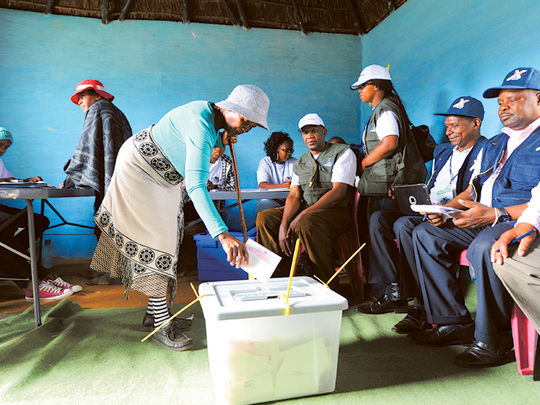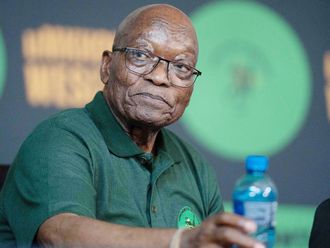
MASERU, Lesotho: Voters in the southern African mountain kingdom of Lesotho went to the polls Saturday in a snap election, six months after an alleged coup bid plunged the country into political crisis.
Voting got underway at 0500 GMT at more than 2,000 polling stations across the landlocked nation, which is completely surrounded by South Africa.
Lesotho has been mired in a political crisis since Prime Minister Thomas Thabane suspended parliament in June 2014 to avoid a motion that would have seen him ousted from power after his fragile coalition government fell apart.
On August 30, soldiers reputedly loyal to the opposition attacked police headquarters, looting weapons and killing one officer.
Thabane described the violence as a coup attempt fuelled by the opposition and fled to neighbouring South Africa. Both the military and opposition denied any bid to topple him.
In Thabane’s home district of Abia, just outside Maseru, about 100 people were queuing outside two army tents in a field, waiting to cast their votes when a convoy of black SUVs pulled up.
The prime minister — short, bald and with a broad grin — stepped from one of the cars and made his way to the tent, guarded by armed police from the regional bloc Southern African Development Community (SADC) who struggled to keep TV cameras at bay.
“The most important thing is for the elections to be free and fair and without incident,” he told reporters after casting his ballot.
Observers from both SADC and the African Union are monitoring the election, and 475 police from neighbouring countries have been deployed to keep the peace.
Analysts have warned the vote could turn violent if any one party wins an outright majority — particularly Thabane’s All Basotho Convention (ABC).
Thabane, however, dismissed the warnings of violence.
“Those kinds of predictions have been made before but it never really took place,” he said.
The “foolishness” of the army — which had been confined to barracks for the day — would not succeed, he said.
“We have to accept the outcome of the election. In the unlikely event that I lose, I will have to accept it.”
Thabane’s party faces stiff competition from the Democratic Congress of Pakalitha Mosisili, a former prime minister, who ruled from 1998 to 2012.
The Democratic Congress won the most National Assembly seats in the 2012 election, but it was Thabane who ended up forming a government, composed of his ABC and two smaller parties.
Thabane, 75, has previously said this will be his last play for power.
Voters in Abia waiting to have their say shielded themselves from the morning chill with thick blankets, and, later, as the sun began to beat down, with umbrellas.
“I’m so glad today is here,” said Peter Matete, 56. “I just want to see my country calm and peaceful.”
“If things could happen to my wish, there wouldn’t be another coalition government, but I don’t think any party will get enough votes to rule alone,” said Matete.
“I can’t wait for Monday when the results are announced,” said Senate Mokorotlo, 28. “This is the end of every trouble.”
Many voters in the area, which is a Thabane stronghold, said that the incumbent had their support, saying they wanted to give him more time to implement his programme.
“I like him personally, and I think he is capable of changing our lives,” said Motselisi Khaebama, 49, from beneath a wide-brimmed straw hat. “I want to give him a chance to finish what he started.”
According to local media, about 1.2 million people are registered to vote in the poll, which was moved forward by two years to try resolve the political deadlock.
—AFP












